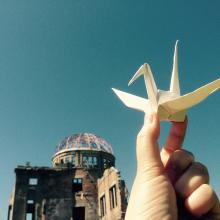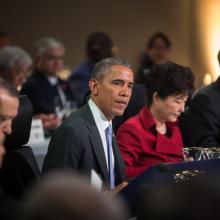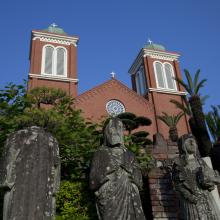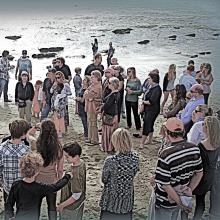Japan
Minus One, which premiered in U.S. theaters on Dec. 1, became the highest grossing Japanese live-action film in U.S. history.
The colonial narrative that colonizers sometimes improve the lives of colonial subjects is false and is used as a propaganda tool by those who seek to justify continued invasion and colonization of the world through imperialism.
Ten days before Donald Trump's inauguration, the former mayor of Hiroshima sent the president-elect a letter calling on the incoming U.S. administration to lead on nuclear non-use in Northeast Asia.
"Keenly aware that your decisions on matters related to nuclear weapons will affect everybody in the world and especially those of us living in Hiroshima, we, Hiroshima citizens and hibakusha (A-bomb survivors), expect these decisions to be wise and peaceable," Tadatoshi Akiba, Hiroshima's former mayor, wrote.

Image via chuugo/Shutterstock.com
Confessing our own violence would not deny violence committed against us. Rather, an apology could call attention to war atrocities of the past and present on all sides. Admitting that the deadliest bombings in history had selfish strategic motivations, admitting that life was so thoroughly devalued and destroyed for no greater good (as if a greater good could exist) could force people on all sides to rethink the “necessities” of other wars past and present. Debunking one war lie could lead to the debunking of many war lies. And governments built on violence, powers upheld and strengthened by the looming threat of death, seek to extinguish the light of truth.

Image via Drop of Light / Shutterstock.com
The White House announced May 10 that President Obama will travel to Hiroshima, Japan, reports The New York Times.
This will be the first time a sitting U.S. president has visited the city where the U.S. dropped an atomic bomb at the end of World War II.

Image via 'Monstress'/Tumblr.
Marjorie Liu and Sana Takeda’s new fantasy comic series Monstress approaches the topics of oppression and survival through one such richly imagined fantasy world. Inspired in part by Liu’s grandparents, survivors of the Japanese invasion of China during World War II, Monstress is a story about the difficulty of overcoming the pain of systemic oppression without losing yourself in rage, pain, and revenge
The U.S. Air Force plans to build six new helipads in the jungle as part of a deal to give close to one-half of the training center acreage back to Japan. Yet right in the middle of these proposed helipad sites lies Takae, a village of about 150 residents. They are the people who will suffer the increased air traffic that is sure to result if the helipads are built. They will also have to abide the possibility of a crash — there have been at least 43 aircraft accidents since 1972, and in 1959 a plane carrying two missiles crashed into a school, killing 17 people and injuring 210.
Now that the air force has a new toy, the MV-22 Osprey helicopter, there have been a lot of trainee pilots going out on practice runs. Unfortunately, the Osprey has established an abysmal safety record compared to earlier models. Its “safety” features are not, in fact, safe for potential bystanders.
Takae residents also believe that the U.S. military would like to use their village as part of its training exercises, an idea that doesn’t seem so farfetched after considering what happened during the Vietnam War. At that time, the U.S. military built a “dummy” village in the jungle and forcefully conscripted Takae residents, one as young as six years old, to wear black clothing and carry on as though they were living in a Vietcong stronghold. The conscripted residents were even required to stage mock attacks from the village.

Pope Francis waves as he leads the Angelus prayer from the window of the Apostolic Palace in St. Peter’s Square at the Vatican August 9, 2015. Photo courtesy REUTERS / Tony Gentile / RNS
Seventy years after the U.S. dropped an atomic bomb on the Japanese city of Nagasaki, Pope Francis on Aug. 9 described the bomb as a “lasting warning to humanity.”
Speaking to the faithful gathered in St. Peter’s Square, Francis recalled the “horror and repulsion” aroused by the twin bombings of Nagasaki on Aug. 9 1945, and Hiroshima, three days earlier.
“This (event) has become the symbol of mankind’s enormous destructive power when it makes a distorted use of scientific and technical progress,” he said.

KPG_Payless / Shutterstock
OVER THE LAST 14 months, I visited Nagasaki six times to prepare for and then participate in the Christian Forum for Reconciliation in Northeast Asia, along with 60 Christian leaders from Japan, the U.S., China, and South and North Korea.
Following the forum, I attended the International Symposium for Peacemaking in Northeast Asia, held at the Nagasaki Atomic Bomb Museum. These events gave me much opportunity to think about nuclear weapons and peacemaking, alone and together with a peaceable community of believers.
The devastating power unleashed on Nagasaki and Hiroshima 70 years ago shocked the human community. I have friends whose families suffered when atomic bombs fell on those two Japanese cities. But Japan was not simply a victim. The Pacific War started with the bombing of Pearl Harbor. And if the Japanese military had then had an atomic bomb, I am quite certain they would have used it.
Today, many are working to abolish nuclear weapons as inhumane and unacceptable. I am convinced that nuclear weapons cannot be justified. But the question “Why should we abolish nuclear weapons?” leads to additional questions: How do we think about wars, about killing and violence, in general? While seeking to abolish nuclear weapons, should we keep on making, selling, and using other kinds of weapons?
In my pastoral counseling class in seminary, the professor played a video of a counseling session of a black couple. He intended for us to learn some lessons on marriage counseling from it, but it turned out to be a laugh fest for the mostly white class. Repeatedly the husband and wife cut each other down with witty insults. My sense is that the couple reminded the students of George and Louise Jefferson from the TV show The Jeffersons. I sat next to an African American student that day and during the break I turned over to him and asked, “Do you find this funny?” He said, “I’m glad you asked,” and proceeded to tell me that he witnessed this kind of behavior firsthand in his own home since his parents are divorced. Needless to say he did not find the video amusing. I encouraged him to voice this to the class, which he courageously did when we returned from break. It seems while the professor intended to communicate one thing from showing the video, it communicated another because of the manner in which the students were racialized.
I share this story as an analogue to the recent controversy surrounding the production of the Seattle Gilbert and Sullivan Society’s The Mikado — a comic opera written in 1885 as a critique of British politics and institutions, set in distant, mysterious, and mostly made-up Japan. It began with Sharon Chan writing an editorial to the Seattle Times, calling the current production of it by an all-white cast as “yellowface” and “open[ing] old wounds and resurrect[ing] pejorative stereotypes.” Since then, Jeff Yang has also written an editorial for CNN.com entitled, “Yellowface staging of ‘The Mikado’ has to end.” I will not rehearse their arguments here; I write to address why this incident matters to North American evangelicals.
TORU HASHIMOTO, the mayor of Osaka and co-leader of the Japanese Restoration Party, has been known for his provocative statements. In May, while speaking with reporters on Japanese wartime behavior, he endorsed rape and sexual enslavement, saying, “When soldiers are risking their lives by running through storms of bullets, and you want to give these emotionally charged soldiers a rest somewhere, it’s clear that you need a comfort-women system.” These comments drew international condemnation, but they also revealed the all-too-familiar interlocking of sexism, militarism, and sexual violence. Far too often, the idea of a greater “noble cause” is used to justify the sacrifice of women to a military sexual slavery system.
During World War II, historians estimate that 100,000 to 200,000 Korean women and girls, ages 11 to 30, along with women and girls from China, the Philippines, Indonesia, and Taiwan, were kidnapped or falsely promised jobs and taken to various locations to serve as “comfort women”—the euphemism for sexual slaves. They “served” an average of 30 to 40 soldiers a day and suffered through beatings, venereal disease, forced abortions, mental anguish, and often death. At the end of the war, these women and girls were killed, forced into suicide, or abandoned. Of the few who were able to return to their homeland, many suffered social alienation, humiliation, poverty, STDs, and endless mental anguish.
The Japanese government had largely denied the existence of Japanese military sexual slavery until 20 years ago, when it offered a statement of apology. The apology was seen as empty by many people, as Japanese politicians and revisionist historians not only reneged on the apology but sought to omit the tragedy from the telling of Japanese history. In response, surviving Korean “comfort women” or halmulni (a term of endearment and respect meaning grandmother) have gathered every Wednesday since 1992 in front of the Japanese embassy in Seoul as a reminder that they demand to be seen, heard, and offered a genuine apology.
When Chinese kids won’t eat their Cheerios, do their parents tell them there are starving kids in America to convince them to finish?

The good news is, we didn’t take their advice; instead, we sold ourselves to China! ***Footnote: I have since been educated on the context of this sign, which makes it understandable. The sign actually suggested that crushing China was a bad thing. Why does history have to go and ruin my fun??? Stupid history!!!
To me, "unexpected" is at the heart of how I understand grace. It is the unearnable gift, the divine reversal and sacred surprise, the still small voice that drowns out the din of the maddening crowd, the little bit extra that my Cajun friends call lagniappe, the very thing we "deserve" the least but get anyway. From God. From the One who created the world and the audacious, indescribably power of love.
Taking a cue from Nell, here are just a few of the unexpected blessings I am grateful for today:
For God's fingerprints that cover every inch of our world, seen and unseen. And for the moments where I can almost make out the holy whirls imprinted in the sky, the ocean, the sunlight, and on the faces and stories of each of us.
For the generosity and selflessness I see so vividly — all around me, all the time — even in these lean, nervous days. I saw it in Zuccotti Park, where strangers prepared and served food to other strangers. I saw it in the sober faces and strong arms of the men who helped 84-year-old Dorli Rainey to safety after she was pepper-sprayed at an Occupy rally in Seattle. I heard it in the prayers lifted at the White House, at North Park University in Chicago, and in the basement of a church in Spanish Harlem where kind, mighty souls formed Human Circles of Protection last week and stood in solidarity with the poor, the vulnerable, and the least of those among us. I watched it on display at border crossings, immigration rallies, refugee camps in the Horn of Africa, and at a glass blower's studio in my hometown of Laguna Beach where strangers arrived with shovels and wheelbarrows to help dig out an artist and his artwork from the muddy ravages of a flash flood. I saw it in the fresh coat of paint on the front steps of my elderly parents' home in Connecticut that my cousins had applied for them with great care and kindness when my brother and I couldn't be there to do it.







